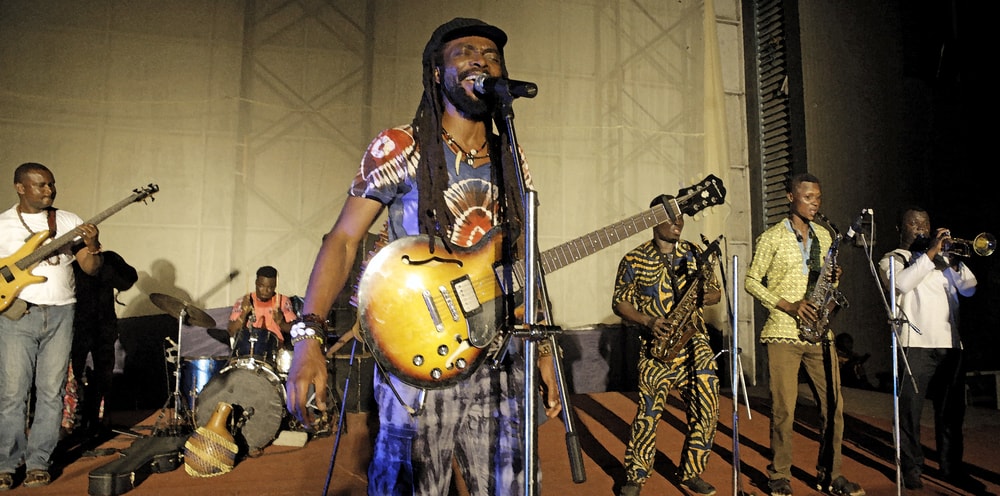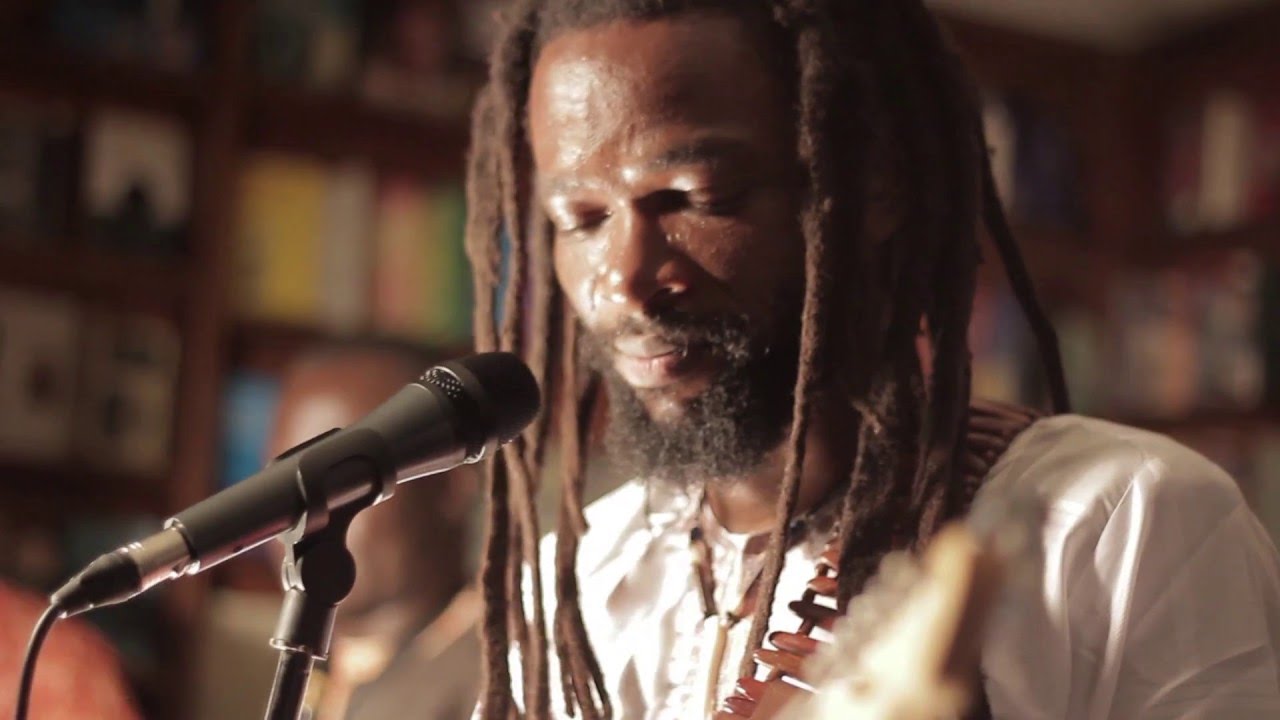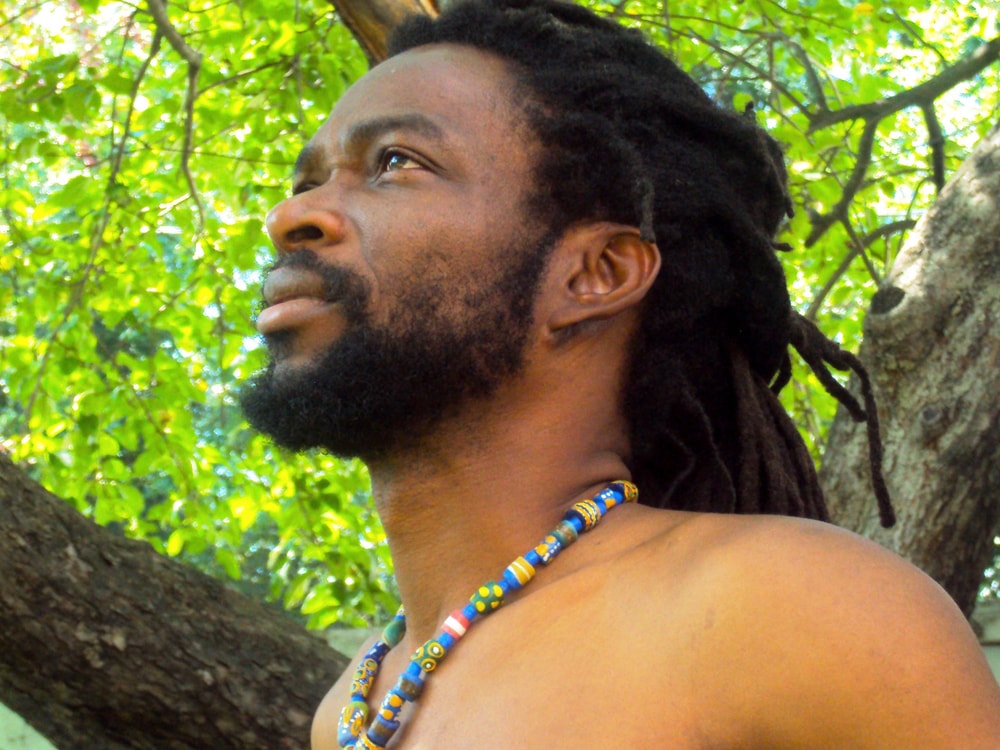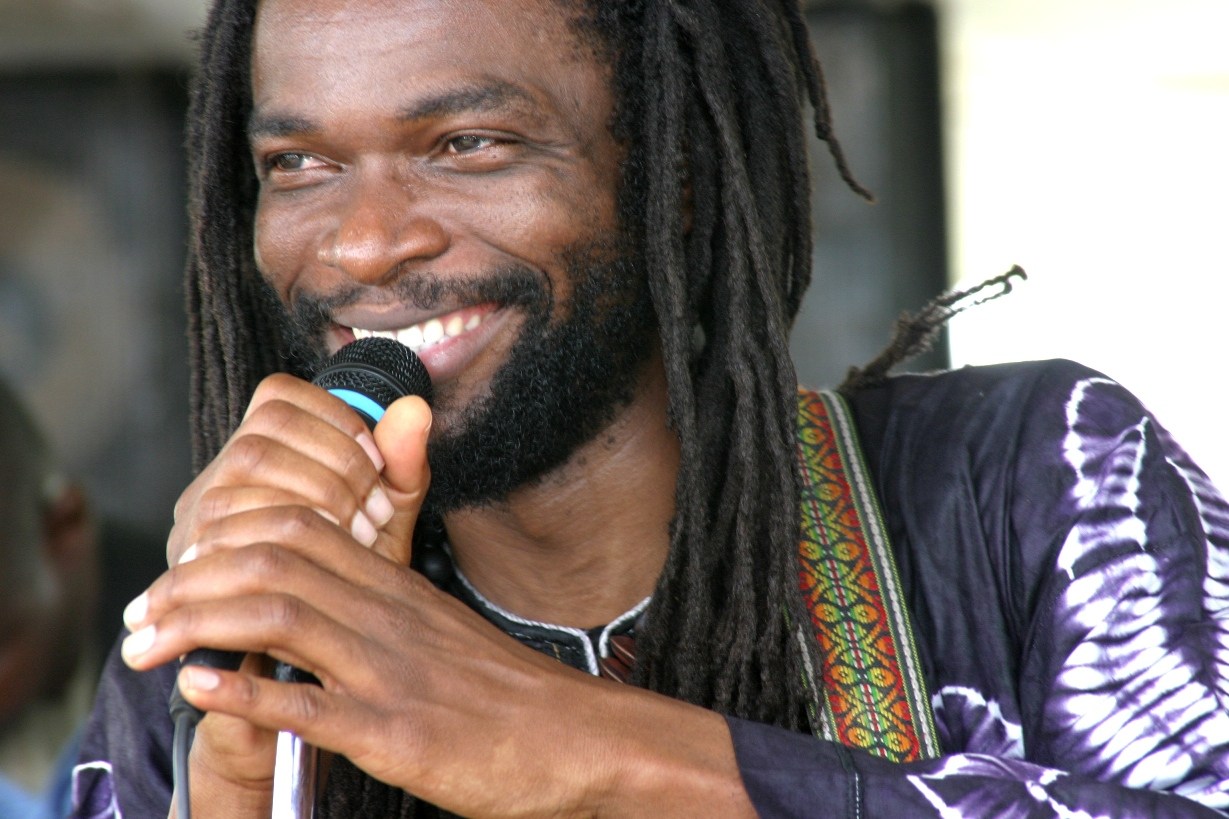21 years after his breakout album, Seven Lives, Beautiful Nubia is still Nigeria’s best folk and roots musician.
Beautiful Nubia (Segun Akinlolu) is a musician, composer, bandleader, songwriter and poet in Nigeria. He formed The Roots Renaissance Band in 1998 and has performed around the world with them. Beautiful Nubia’s music is heavily influenced by traditional culture and folklore. In this interview with PAM, Beautiful Nubia talks about his music, philosophies, political and cultural ideas another other things.
Do you think Western ideologies are at the root of the problems facing Africans today?
Not the ideologies themselves but how we have failed spectacularly to adapt them to our own peculiar situation and needs. We were too quick to turn our back on ancient African traditional wisdom – the well-tested social, political and economic systems of our ancestors, including areas such as healthcare, education, environmental protection and nature conservation. One could blame the Europeans who colonized our people for belittling the African ways of knowing to the point that the natives started to find them repugnant, but we ourselves, in light of what we now know, have not done much to free ourselves of these shackles.
In my music, I am constantly trying to show our people the path to true liberation: the African who would be able to sit as an equal partner with others in the so-called emerging world order, must be a perfect amalgam of ancient traditional wisdom and modern knowledge. You take the best of what was known, well-tested and practised by our ancestors, merge it with the best of the trendy and modern and create something new and original, something that sets you apart and makes others respect you. To re-build our societies and make them thrive again as in the days of old, we need total renewal and rebirth – individually and communally – a change in the way we think and act in response to our realities and challenges.
We must, through well-thought-out education programs, teach our children and help our youth to refocus their energies and minds towards a strong desire for productive work, selflessness, honesty of purpose, cooperation, perseverance, patience and contentment. We must raise a new generation of high-quality people whose focus would be on creating better and progressive systems that would lead to the enthronement of order and the possibility of a good life for all. To achieve these reforms, we can learn from what some so-called modern societies have done but the core of our efforts must revolve around those high traditional values and ancient African wisdom.

In addition to singing, performing and writing songs, you also write fiction and poetry, what do you think is the nexus between music and literature?
Music and Literature connect at the place where truth meets reality. For a multi-dimensional artist like me, the two are interwoven and inseparable. Sometimes I tell my fans to listen to my music as if reading a book because that gentle strain of sound could be a loaded phrase depending on how “into it” you are. I knew I could compose songs from about the age of 9, started telling stories earlier than that, and poetry came in my early teens.
Sometimes, I write a song and then realize it’s so poetic you could read it without the music and enjoy it (for example, “Seven Lifes”, “Akojade” or “Monkey Wear Shoe”) and other times, I write what I consider a poem and, one day, I add a melody and it becomes a song – just like that. In both music and literature, one is only painting pictures, expressing ideas or dramatizing life – in sound or on a page – in hues that connect with the emotions of the audience. I am a ball of artistic potential and it is a blessing to be able to express my gift in all these different but interconnected ways.
Can you tell me about your songwriting process?
It is hard to explain but what I can tell you is that some come almost fully formed with all the words and melody in place (for example, “Seven Lifes” which I wrote one evening after a stroll while I was a student at the University of Ibadan in 1989). Others come as basic melodies onto which I later add lyrics. Several started out as poems and became songs once I layered on some melody. Some are finished in less than one hour; some take years (I wrote the main Yoruba part of “What A Feeling!” in 1984 while in high school but it took me another 10 years to compose the English chorus and another 5 years to write the concluding Yoruba part).
I prefer to write when the impulse comes, but I am sometimes approached to write on demand. I do not like to work under such pressure, but two of my most famous songs, “Owuro L’ojo” and “Ikoko Akufo” came from that process. Some tunes come to me while I am asleep; so many arrive while I am taking my habitual leisure walk; some come from virtually thin air, and others are inspired by things going on around me.
I do not try to write what I think people will like, I write whatever comes to me, I write what I like. It is wonderful to know that some of these songs have become a daily staple for many and a source of positive influence.

Do you think musicians are custodians of culture and tradition?
Due to the peculiar characteristics of the discipline, a musician is well placed to be a custodian of culture and tradition – reminding the people of what used to be, what is and what could be if we all made certain adjustments. It is a high calling. However, a musician can be whatever he or she sets out to be – an entertainer, a teacher, a life coach, a social revolutionist, a language and culture custodian, a philosopher, anything or a mixture all of these. It is mostly a matter choice, but some have no choice in the direction of their art. The latter is true for me, I have to do what I was “sent” to do: I play music to teach, to enlighten, to guide, to inspire, to embolden, to lead my listeners towards the path to personal happiness and fulfilment; and communal growth and development. My music, of course, has a high entertainment quotient, but it is primarily a tool of mass sensitization and re-orientation.
In Awokose, you sang about how hard work and honesty doesn’t necessarily translate to wealth and respect in our society, what do you think is the reason for this?
As I said earlier, for us to have progress in Nigeria and Africa, we must embrace traditional African wisdom and knowledge, the most important part of which is the value system that rewards and values hard work, honesty, selfless service and good-heartedness. We blame the young for seeking shortcuts and not working hard enough, but they can see that they live in a society where those who do honest work end up in penury while the dishonest, the callous, the wicked and the greedy get ahead. In both our ancient and not-so-distant pasts, he or she who was wise was accorded the highest respect and honour by all but today the Nigerian society is a “cash and carry” one in which anyone who has money, irrespective of how he came by it, can buy a leadership position and get away with anything. However, history shows us that societies that are built on this shallowness never last long. To have true growth and development, we must promote and return to those old values.
You sing in the company of a band, ‘The Roots Renaissance Band’, how did the band come to be?
The band was formally established in 1998 but we started the process in 1997. The first member was Emmanuel Omilabu, a keyboardist and music producer. With him and some others, we built the numbers gradually until we had the full crew of Drummer, Percussionist, Bass Guitarist, Lead Guitarist, Gangan (Talking) Drummer, Bata drummer, 3 Backing Vocals, Keyboardist and 3 Horns-men. That has remained our favourite formation to date but it varies in size – we can be anything between 8 and 14 – depending on the demands of each performance. The initial group was together mostly unchanged for several years, but some of those early members have moved on and have been replaced by younger elements; it is still very much a band of friends.

Beriwon, the opening track of ‘Atunluto’ calls out to Ẹgbẹ́ atúnlù́tò (the reformers) that the time to reform the society is here, who do you think are the reformers of our society, especially in a country like Nigeria faced with leadership and governance challenges?
The reformers are people of goodwill, those who wish to see the land returned to glory, who wish to see true change and development, those who are concerned and prepared to make the sacrifices necessary to bring about the renewal of the society. Sometimes, it seems as if all is lost, hopeless, totally insoluble, but I believe it is possible to halt the present celebration of mediocrity in the land. People of goodwill must shed their pretensions and egos and come together to bravely face the problem.
In one of our songs (“One Good Soul” from 2015’s Soundbender), we say, “Even one good soul is a blessing to society”. There are lots of people, from all walks of life and disciplines, whose talents can work together to kick-start a “thought revolution” and help rebuild the society. The mediocre, corrupt and insensitive people who run things across Nigeria today were not well prepared for leadership by those who raised them up and by the society; we must aim to build a new generation of people who can move us in the direction of positive growth and excellence. I believe it is doable.
What do you think is the role of the musician in politics?
As I stated earlier, a musician can be anything he or she wishes to be. Music can be used as a political tool – both positively and negatively – and a musician can, like any other citizen, decide that he or she wants to go into politics. My advice is that whether one is a musician or not, we should always go into every engagement with honesty of purpose and a heart for good. Our society has been abused and destroyed long enough, it is time to halt the retrogression and start rebuilding. People listen to musicians, our words have weight, especially amongst the most vulnerable in society – the young, the disenfranchised, the weak and the downtrodden masses. Musicians could be using their works to lift the people, not to further grind them down in ignorance and backwardness.
In Afurugbin, you talked about contentment and legacy and how our materialistic society hinders our growth, do you think this is a problem caused by capitalism, what do you think are the alternatives of managing wealth distribution in the African society?
A vulnerable society like ours cannot have unfettered capitalism unleashed on it. As I said earlier, we must engage modern practices with ancient traditional African wisdom. Have you ever heard of the existence of homelessness in old Africa, even amongst the Yorubas who were one of the most urbanized of ancient societies? We always took care of ourselves, because we knew that the pain and suffering of even just one person diminish all of us and our hold on peace. Ancient wisdom tells us, “You cannot be happy if your neighbour is not at peace, and you cannot be at peace if your neighbour is not happy”. It also tells us, “You are only as rich as the poorest in your community”. We need to build a society where everyone feels welcome, where good dreams can come true, where there is fairness, equal access to comfort and the basic, good things of life.
Can you tell me about the EniObanke Music Festival (EMUfest)?
EMUfest, Nigeria’s premier annual celebration of traditional and contemporary folk music, provides a platform for the discovery and encouragement of new or emerging artistic talent and the celebration of established names. Since 2010, it has featured several legendary and highly regarded artists. In that same period of time, the festival has showcased over 300 new and emerging young talents. 2019 will be our 10th anniversary and we are hoping it will be grand.




